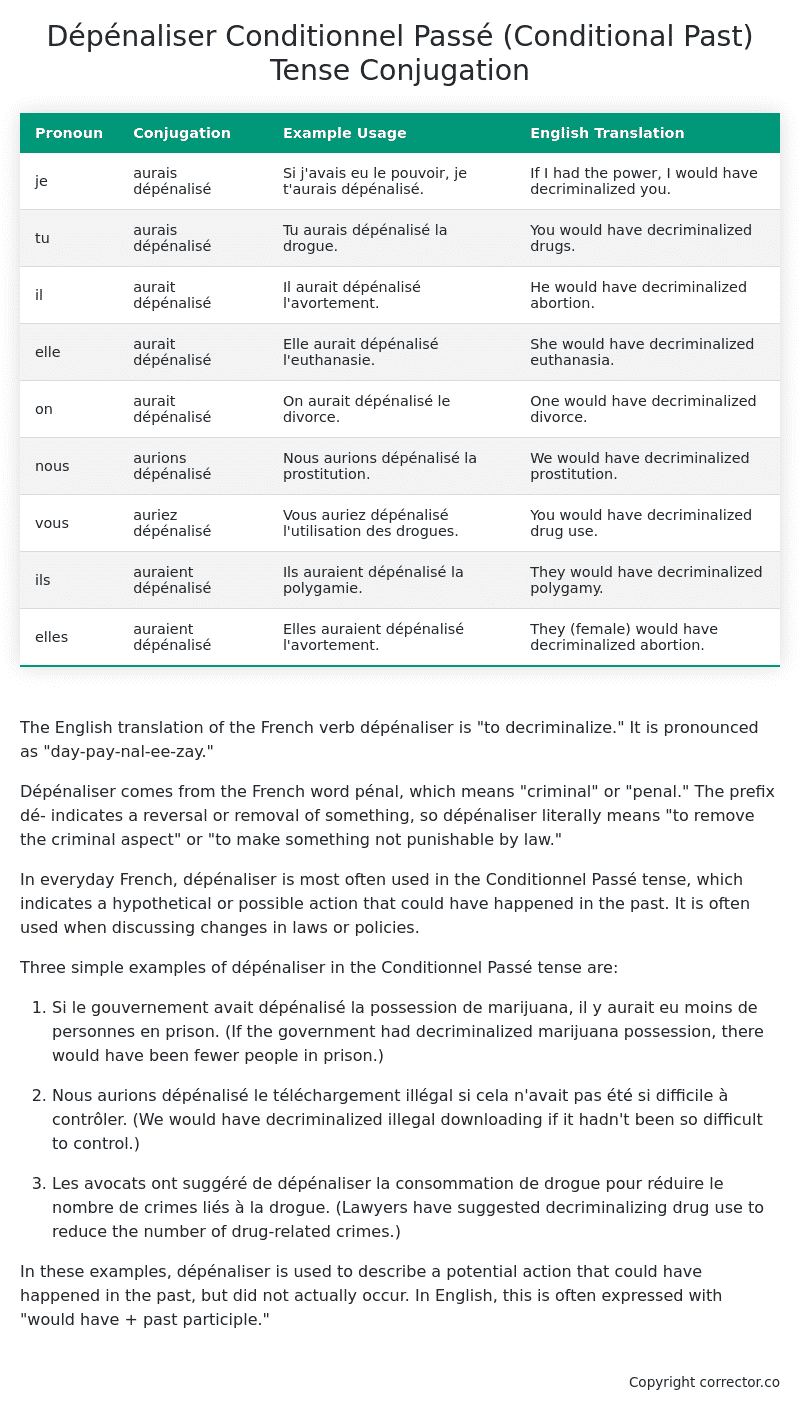Conditionnel Passé (Conditional Past) Tense Conjugation of the French Verb dépénaliser
Introduction to the verb dépénaliser
The English translation of the French verb dépénaliser is “to decriminalize.” It is pronounced as “day-pay-nal-ee-zay.”
Dépénaliser comes from the French word pénal, which means “criminal” or “penal.” The prefix dé- indicates a reversal or removal of something, so dépénaliser literally means “to remove the criminal aspect” or “to make something not punishable by law.”
In everyday French, dépénaliser is most often used in the Conditionnel Passé tense, which indicates a hypothetical or possible action that could have happened in the past. It is often used when discussing changes in laws or policies.
Three simple examples of dépénaliser in the Conditionnel Passé tense are:
-
Si le gouvernement avait dépénalisé la possession de marijuana, il y aurait eu moins de personnes en prison. (If the government had decriminalized marijuana possession, there would have been fewer people in prison.)
-
Nous aurions dépénalisé le téléchargement illégal si cela n’avait pas été si difficile à contrôler. (We would have decriminalized illegal downloading if it hadn’t been so difficult to control.)
-
Les avocats ont suggéré de dépénaliser la consommation de drogue pour réduire le nombre de crimes liés à la drogue. (Lawyers have suggested decriminalizing drug use to reduce the number of drug-related crimes.)
In these examples, dépénaliser is used to describe a potential action that could have happened in the past, but did not actually occur. In English, this is often expressed with “would have + past participle.”
Table of the Conditionnel Passé (Conditional Past) Tense Conjugation of dépénaliser
| Pronoun | Conjugation | Example Usage | English Translation |
|---|---|---|---|
| je | aurais dépénalisé | Si j’avais eu le pouvoir, je t’aurais dépénalisé. | If I had the power, I would have decriminalized you. |
| tu | aurais dépénalisé | Tu aurais dépénalisé la drogue. | You would have decriminalized drugs. |
| il | aurait dépénalisé | Il aurait dépénalisé l’avortement. | He would have decriminalized abortion. |
| elle | aurait dépénalisé | Elle aurait dépénalisé l’euthanasie. | She would have decriminalized euthanasia. |
| on | aurait dépénalisé | On aurait dépénalisé le divorce. | One would have decriminalized divorce. |
| nous | aurions dépénalisé | Nous aurions dépénalisé la prostitution. | We would have decriminalized prostitution. |
| vous | auriez dépénalisé | Vous auriez dépénalisé l’utilisation des drogues. | You would have decriminalized drug use. |
| ils | auraient dépénalisé | Ils auraient dépénalisé la polygamie. | They would have decriminalized polygamy. |
| elles | auraient dépénalisé | Elles auraient dépénalisé l’avortement. | They (female) would have decriminalized abortion. |
Other Conjugations for Dépénaliser.
Le Present (Present Tense) Conjugation of the French Verb dépénaliser
Imparfait (Imperfect) Tense Conjugation of the French Verb dépénaliser
Passé Simple (Simple Past) Tense Conjugation of the French Verb dépénaliser
Passé Composé (Present Perfect) Tense Conjugation of the French Verb dépénaliser
Futur Simple (Simple Future) Tense Conjugation of the French Verb dépénaliser
Futur Proche (Near Future) Tense Conjugation of the French Verb dépénaliser
Plus-que-parfait (Pluperfect) Tense Conjugation of the French Verb dépénaliser
Passé Antérieur (Past Anterior) Tense Conjugation of the French Verb dépénaliser
Futur Antérieur (Future Anterior) Tense Conjugation of the French Verb dépénaliser
Subjonctif Présent (Subjunctive Present) Tense Conjugation of the French Verb dépénaliser
Subjonctif Passé (Subjunctive Past) Tense Conjugation of the French Verb dépénaliser
Subjonctif Imparfait (Subjunctive Imperfect) Tense Conjugation of the French Verb dépénaliser
Conditionnel Présent (Conditional Present) Tense Conjugation of the French Verb dépénaliser
Conditionnel Passé (Conditional Past) Tense Conjugation of the French Verb dépénaliser (this article)
L’impératif Présent (Imperative Present) Tense Conjugation of the French Verb dépénaliser
L’infinitif Présent (Infinitive Present) Tense Conjugation of the French Verb dépénaliser
Struggling with French verbs or the language in general? Why not use our free French Grammar Checker – no registration required!
Get a FREE Download Study Sheet of this Conjugation 🔥
Simply right click the image below, click “save image” and get your free reference for the dépénaliser Conditionnel Passé tense conjugation!

Dépénaliser – About the French Conditionnel Passé (Conditional Past) Tense
Formation
Common Everyday Usage Patterns
Expressing Unreal Past Scenarios
Polite Requests or Suggestions
Expressing Doubt or Uncertainty
Interactions with Other Tenses
Conditional Present
Indicative Past Tenses
Conditional Future
Summary
Want More?
I hope you enjoyed this article on the verb dépénaliser. Still in a learning mood? Check out another TOTALLY random French verb conjugation!


